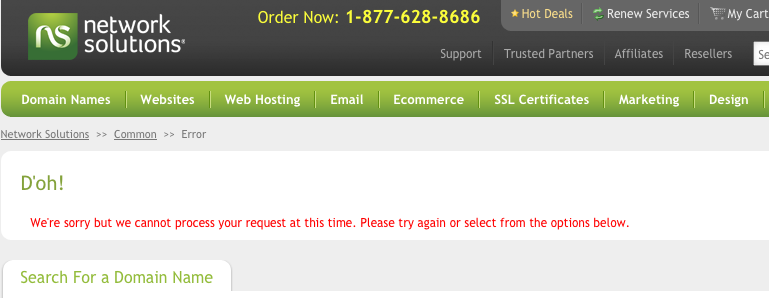It wasn’t D’oh that I said when I was stymied in my attempt to update a nameserver record.
Amazon’s Cloud service failure
A client of ours wants to host their video subscription site on Amazon’s cloud services. Last week they had an outage. Egads, this was not to supposed to happen. A point of view by Scott Gilbertson:
Amazon Autopsy Reveals Causes of Cloud Death
Amazon is also promising to improve its communication with customers when things go wrong, but as we pointed out earlier, the real problem is not necessarily Amazon. While Amazon’s services unquestionably failed, those sites that had a true distributed system in place (e.g. Netflix, SmugMug, SimpleGeo) were not affected.
In the end it depends how you were using EC2. If you were simply using it as a scalable web hosting service, your site went down. If you were using EC2 as a platform to build your own cloud architecture, then your services did not go down. The later is a very complex thing to do, and it’s telling that the sites that survived unaffected were all large companies with entire engineering teams dedicated to creating reliable EC2-based systems.
That may be the real lesson of Amazon’s failure — EC2 is no substitute for quality engineers.
Amazon has offered its promised apology. It’s published its post-mortem on the recent outage of its AWS EC2 (Amazon Web Services Elastic Compute Cloud) and RDS (Relational Database Service). It says what went wrong and how it’s planning to avoid such problems in the future.
Techie debate over cloudhosting services
Rackspace vs Amazon Web Services
http://news.ycombinator.com/item?id=2448812
Understanding why cloud services (software as a service, saas) removed infrastructure as a competitive advantage:
http://redmonk.com/sogrady/2011/03/11/how-important-is-software/
And what does Cloud services even mean?!
Read the article at readwriteweb.com
And how Facebook has released an open computing initiative, removing infrastructure (hardware, software) as a competitive advantage for competitors.
Even email can outsourced to a cloud provider. Enter: Amazon Simple Email Service (Amazon SES) (but beta), and a former Twitter techie’s Message Bus API.
Read the article at Twitter and Webshots Veterans Launch New E-Mail API
How to speed up your website
We discovered a useful social media website called Store Crowd
http://storecrowd.com/blog/pageload-time/
From their description: StoreCrowd is a Social Engine for sharing your favorite deals. Built lovingly in Melbourne, Australia we are trying to change the way people share great bargains with friends.
See what steps they took to minimize page load time… advanced strategies like:
Speed up the Application / Server
- Use Fragment Caching on elements that change less frequently
- Memcache & CacheMoney
- MYSQL Indexes & Query Optimization
- Dedicated Database Servers
Reduce Number of Queries
- Combine Javascript & CSS into a single file & minimize
- Use CSS Sprites
Reduce the load time elements
- Make sure Gzip is Enabled on your Server
- Move 3rd party scripts to the bottom of the page
- Move all static content to a CDN
- Compress all images with Smusher
If Libya shut off the internet, why does bit.ly still work?
Twitter users, fyi: the Libyan government has “shut off” the internet in their country. All websites hosted there are inaccessible. However, domain names like http://bit.ly (a URL shortening service used for Twitter) still function because they are not hosted inside the country. Hopefully some citizens of the country can use international dial-up services to access the global internet and keep getting the word out.
Protect your website from being hacked
Here is a very useful article by Steven Whitney devoted to helping you protect your website from being hacked.
This link came my way via a commenter on a LinkedIn discussion board, Caroline Bogart, from Massachusetts.

